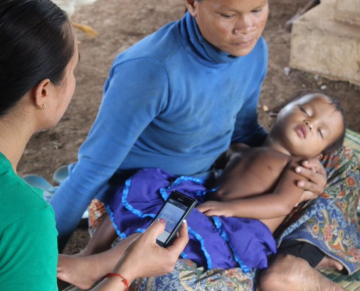Malaria Consortium publishes important research on pneumonia diagnostics in Lancet journal
25 June 2019
London, 25 June 2019 – Malaria Consortium is pleased to announce the publication of a research paper on pneumonia diagnostics in the open access eClinical Medicine journal, owned by The Lancet.
The paper is based on research conducted by Malaria Consortium with technical support from Karolinska Institute and the University of Gothenburg, funded by the Bill & Melinda Gates Foundation.
The paper reports on the performance of four respiratory rate counters in detecting pneumonia symptoms in low-resource settings – in this case in Cambodia, Ethiopia, South Sudan and Uganda. Respiratory rate counting devices are frequently inadequate or unavailable in these contexts, which makes accurate diagnosis of pneumonia extremely difficult for community-based health workers.
The four timers tested were evaluated on 454 children. The devices were the Mark Two ARI timer, counting beads with ARI timer, Rrate Android phone and the Respirometer feature phone applications.
The study found that none of the four devices performed well enough to replace the current standard practice, the ARI timer. New, automated respiratory rate timers are required to support health workers better in correctly diagnosing pneumonia in these settings.
This study follows on from the publication of a protocol paper, published in JMIR Protocols in October 2018, which initially assessed the suitability of 188 possible respiratory rate timers and pulse oximeters for use as pneumonia diagnostics in children under five in these settings.
Of these options, five pulse oximeters and four respiratory rate timers were selected to then be assessed in the field by frontline health workers. The eClinical Medicine paper reports on the performance of the four respiratory rate timers. Further papers are planned on the performance of the five pulse oximeters and the acceptability and usability of all nine devices to frontline health workers.
Kevin Baker, Research Specialist at Malaria Consortium and lead author on both papers, said: “We are delighted to have this research published and made available to everyone. These studies are crucial as we seek to find easy-to-use, accurate, cost-effective and sustainable tools that can better help community health workers diagnose pneumonia accurately.”
Dr Karin Kallander, Senior Health Advisor at UNICEF and senior author on both papers, said: “Pneumonia kills around one million children under five every year, even though deaths can be easily prevented with effective diagnostics and access to treatment. Finding tools that work well in low-resource settings – particularly in Southeast Asia and Sub-Saharan Africa where pneumonia is most prevalent – is critical.”
Access the eClinicalMedicine journal paper, ‘Performance of four respiratory rate counters to support community health workers to detect the symptoms of pneumonia in children in low resource settings: a prospective, multicentre, hospital-based, single-blinded, comparative trial’, here.
Access the JMIR Protocols paper here.
For media enquiries, please contact Michael Haydock, communications manager: [email protected]
Latest news
- Malaria Consortium honoured by Ugandan government for contribution to combat malaria23rd April 2024
- International summit calls for AMR accountability in public health interventions21st March 2024
- Global SMC community celebrates new milestone at SMC Alliance Annual Meeting in Nigeria6th March 2024
- Scaling up key interventions could halve pneumonia-related childhood mortality13th February 2024
- Malaria Consortium and eGov Foundation join Mozambique’s national malaria programme to digitalise seasonal malaria chemoprevention campaigns8th February 2024
- World’s first malaria vaccine rollout launched in Cameroon22nd January 2024